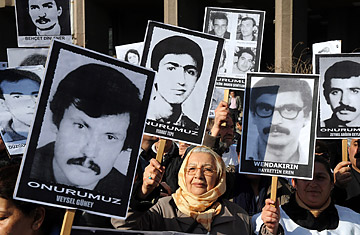
Turkish leftist demonstrators shout slogans as they hold pictures of people who were executed or died in jail during military rule after a 1980 coup, in front of the court in Ankara, Turkey, April 4, 2012.
I grew up in the long, dark, soul-numbing shadow of Turkey's 1980 military coup. Although just a child, I recall tanks, manned by young gun-toting soldiers, ominously patrolling our street, months of curfew, my parents' hushed and anguished late-night conversations over my uncle, a professor who was arrested and jailed without news for months. (He belonged to a left-wing NGO.) He was one of some 650,000 people, mostly young leftists, who were rounded up — an entire political class destroyed almost overnight. Arrest meant certain torture. "When someone you knew was arrested, your heart would sink because you knew for sure they would be subjected to unspeakable abuse. That's how widespread it was," says Sedat Ergin, a well-known journalist for Hurriyet newspaper. Above all, I remember the crushing sense of fear.
Thirty-two years on, Turkey has finally begun reckoning with one of the darkest chapters in its modern history.
Two retired generals — previously untouchable — who led the coup are on trial this week for crimes against the state. Although the procedure is largely symbolic — both Kenan Evren, 94, and Tahsin Sarikaya, 87, are old and frail — perhaps what really matters is the public outpouring it has evoked. Some 500 people, political parties and groups have signed on as co-plaintiffs. Thousands of demonstrators, many with their own personal and painful accounts of that era, have gathered in front of the Ankara courthouse to witness the proceedings.
"Even though some say this trial is insufficient, it is nonetheless an important milestone for Turkish democracy," says Ergin. Critics have called for the trial to develop into a full-blown investigation into the violence of that era, much like South Africa's Truth and Reconciliation Commission.
That, though, is unlikely. Prime Minister Recep Tayyip Erdogan appears more interested in quashing the military's traditional role as self-appointed guardian of Turkish politics, than in facilitating national healing. Over the past decade he has used European Union-inspired reforms to steadily trim their powers. Evren and Sarikaya are being tried as a result of a constitutional change last year that lifted their lifelong immunity from prosecution.
For their part, the generals deny any violation; in public remarks, they appear affronted at having to defend their actions. They have not yet appeared in court, citing ill health. Judges on Thursday asked for medical reports before ruling on whether the indictment can be read in their absence.
Turkey was no stranger to coups — there had been two previously in 1960 and 1971. At the time, the 1980 intervention was welcomed by many Turks who were wearied by a decade of political infighting and violent left-right street clashes in which thousands of youths were killled. But the coup's aftermath proved different from its predecessors — the generals set out to depoliticize society in order to wipe out sectarian political division. This led to brutality and repression on an unseen scale. Some 650,000 people were rounded up, arbitrarily detained for months and tortured. Hundreds are believed to have died in jail; 49 people were executed. Newspapers were shut down, journalists imprisoned, trade unions purged, strikes banned. The Turkish Left never really recovered from the trauma.
It took three years to return to civilian governance — and even then, the military continued to rule behind the scenes. They also left behind an ironcast legacy in the shape of an authoritarian constitution that is still largely in place.
The military eventually met its match in Recep Tayyip Erdogan — a pious Muslim and strident political Islamist first elected in 2003. Curbing the military became his political mission, not least because his own political survival was at stake — the generals tried to oust him from office as recently as 2007 but failed. Since then, hundreds of officers and several generals have been arrested as part of a mammoth and controversial investigation into that unsuccessful coup.
Erdogan campaigned on promises for a new constitution last year. He won the election but without the decisive margin that would allow his AK party to write it single-handedly. It is now unclear whether he will work with different political parties to build consensus.
Indeed, Erdogan himself is accused of an increasingly authoritarian bent. He tolerates little dissent, readily suing journalists and cartoonists who criticize him. Hundreds of Kurdish activists, including a well-known international relations professor and publisher, are currently behind bars, along with dozens of counter-establishment journalists. "This issue is not just what happened in 1980," says Ergin. "1980 lives on in the form of the constitution, in the form of a particular mentality. This is what needs to change."
That mentality is pervasive and trickles down to the smallest units of Turkish society. In an inspired coincidence, last weekend I met up with some classmates from primary school. We recalled how we all believed that Kenan Evren was like a benevolent uncle. But rough measures were the norm, even for children. We remembered how our austere teacher regularly beat kids, banging their heads against the blackboard, and pulling our ears as punishment. All that was fairly typical back then. And though schools and jails are now much less violent, that is the kind of authoritarianism that still lingers, seemingly sewn into the fabric of Turkish society. So even though the Evren trial will probably not deliver the healing the country needs, it is a start.
